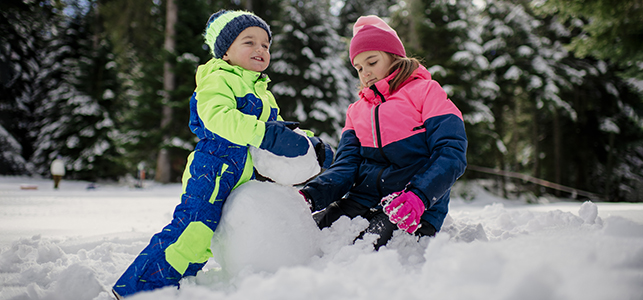
Whether your parents said it when you were growing up, or it simply seems to make sense, you might be swearing by a myth or two when it comes to your family’s wintertime health.
Pediatrician Dr. Bergen Nelson covers some common statements we’ve all heard – or said – and whether there’s any truth behind them.
Why are these statements about winter health not completely accurate? A pediatrician explains
-
Kids get sick from going outside without a jacket.
Respiratory illnesses are more common in the colder months, but it’s not because of lack of proper outdoor attire. It’s actually because we spend more time inside and in close proximity with other people, allowing viruses and germs to spread more easily. This is why we encourage sneezing into the elbow, practicing proper hand hygiene and staying home when sick. That said, it’s still a good idea for kids to wear a jacket when outside in the cold weather. Side note: This same explanation applies to going outside with wet hair. It won’t cause illness, but it won’t be comfortable either.
-
You lose most of your body heat through your head.
We do lose heat through our head, but not most of it. It may feel this way though because it’s often one of the only parts of our body that’s not covered when out in the cold weather. Wearing a hat does help with staying warm and protects fragile ears from frost bite, so don’t let your kids ditch it when playing outside for an extended period.
-
My kids don’t need sunscreen in the winter.
Myth, myth, myth. Skin can be damaged by the sun any time of the year. Snow and ice also reflect UV rays, making them extra harmful. Not only will sunscreen provide protection from the sun, but it can also help lock in moisture and prevent skin from becoming chapped and irritated by the cold, dry air.
-
Vitamin C prevents colds.
Studies have shown that taking daily Vitamin C supplements doesn’t prevent colds, but it may slightly lessen their length and severity. To reap these benefits, Vitamin C has to be taken over time and not only when the first symptoms of a cold have already appeared. Most people who have a healthy diet get plenty of Vitamin C, so keep encouraging those fruits and veggies.
-
Allergies aren’t a problem in the winter.
Pollens aren’t problematic in the winter – which is welcome relief for many Virginians – but indoor allergens don’t go away. Mold spores, dust mites and animal dander, for example, can be particularly troublesome when kids are stuck indoors, causing flares of allergies and asthma too.
-
Green or yellow snot means antibiotics are needed.
We’ve already covered that respiratory illnesses are common, and that allergies don’t disappear, in the winter months. Infections and allergies can thicken mucus and turn in yellow or green, but antibiotics aren't always the answer. Antibiotics should only be prescribed for bacterial infections that won’t get better on their own. They are not effective against viruses and using them when they’re not needed can have negative side effects, including killing “good” bacteria in the body and causing bacteria to evolve so certain antibiotics are no longer useful against them.
-
It’s too late for my child to get a flu shot.
It’s ideal to get the flu shot by the end of October for protection by peak flu time – but it’s better to get one now than not at all. It takes a couple weeks for antibodies to develop, so it can still provide protection during this flu season. Make sure your child gets their COVID vaccine and is up to date with their routine immunizations as well.
